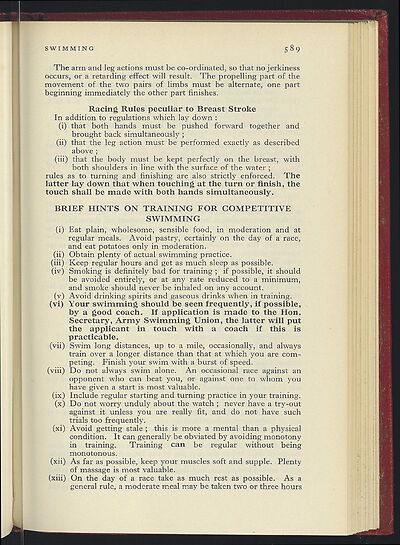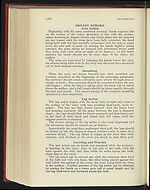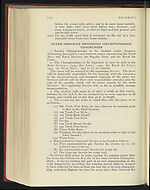1939-40
(615)
Download files
Complete book:
Individual page:
Thumbnail gallery: Grid view | List view

�4,'A
SWIMMING
5
8
9
The arm and leg actions must be co-ordinated, so that no jerkiness
occurs, or a retarding effect will result. The propelling part of the
movement of the two pairs of limbs must be alternate, one part
beginning immediately the other part finishes.
Racing Rules peculiar to Breast Stroke
In addition to regulations which lay down:
(i) that both hands must be pushed forward together and
brought back simultaneously;
(ii) that the leg action must be performed exactly as described
above ;
(iii) that the body must be kept perfectly on the breast, with
both shoulders in line with the surface of the water ;
rules as to turning and finishing are also strictly enforced. The
latter lay down that when touching at the turn or finish, the
touch shall be made with both hands simultaneously.
BRIEF HINTS ON TRAINING FOR COMPETITIVE
SWIMMING
(i) Eat plain, wholesome, sensible food, in moderation and at
regular meals. Avoid pastry, certainly on the day of a race,
and eat potatoes only in moderation.
(ii) Obtain plenty of actual swimming practice.
(iii) Keep regular hours and get as much sleep as possible.
(iv) Smoking is definitely bad for training ; if possible, it should
be avoided entirely, or at any rate reduced to a minimum,
and smoke should never be inhaled on any account.
(v) Avoid drinking spirits and gaseous drinks when in training.
(vi) Your swimming should be seen frequently, if possible,
by a good coach. If application is made to the Hon.
Secretary, Army Swimming Union, the latter will put
the applicant in touch with a coach if this is
practicable.
(vii) Swim long distances, up to a mile, occasionally, and always
train over a longer distance than that at which you are com-
peting. Finish your swim with a burst of speed.
(viii) Do not always swim alone. An occasional race against an
opponent who can beat you, or against one to whom you
have given a start is most valuable.
(ix) Include regular starting and turning practice in your training.
(x) Do not worry unduly about the watch; never have a try-out
against it unless you are really fit, and do not have such
trials too frequently.
(xi) Avoid getting stale; this is more a mental than a physical
condition. It can generally be obviated by avoiding monotony
in training. Training can be regular without being
monotonous.
(xii) As far as possible, keep your muscles soft and supple. Plenty
of massage is most valuable.
(xiii) On the day of a race take as much rest as possible. As a
general rule, a moderate meal may be taken two or three hours
SWIMMING
5
8
9
The arm and leg actions must be co-ordinated, so that no jerkiness
occurs, or a retarding effect will result. The propelling part of the
movement of the two pairs of limbs must be alternate, one part
beginning immediately the other part finishes.
Racing Rules peculiar to Breast Stroke
In addition to regulations which lay down:
(i) that both hands must be pushed forward together and
brought back simultaneously;
(ii) that the leg action must be performed exactly as described
above ;
(iii) that the body must be kept perfectly on the breast, with
both shoulders in line with the surface of the water ;
rules as to turning and finishing are also strictly enforced. The
latter lay down that when touching at the turn or finish, the
touch shall be made with both hands simultaneously.
BRIEF HINTS ON TRAINING FOR COMPETITIVE
SWIMMING
(i) Eat plain, wholesome, sensible food, in moderation and at
regular meals. Avoid pastry, certainly on the day of a race,
and eat potatoes only in moderation.
(ii) Obtain plenty of actual swimming practice.
(iii) Keep regular hours and get as much sleep as possible.
(iv) Smoking is definitely bad for training ; if possible, it should
be avoided entirely, or at any rate reduced to a minimum,
and smoke should never be inhaled on any account.
(v) Avoid drinking spirits and gaseous drinks when in training.
(vi) Your swimming should be seen frequently, if possible,
by a good coach. If application is made to the Hon.
Secretary, Army Swimming Union, the latter will put
the applicant in touch with a coach if this is
practicable.
(vii) Swim long distances, up to a mile, occasionally, and always
train over a longer distance than that at which you are com-
peting. Finish your swim with a burst of speed.
(viii) Do not always swim alone. An occasional race against an
opponent who can beat you, or against one to whom you
have given a start is most valuable.
(ix) Include regular starting and turning practice in your training.
(x) Do not worry unduly about the watch; never have a try-out
against it unless you are really fit, and do not have such
trials too frequently.
(xi) Avoid getting stale; this is more a mental than a physical
condition. It can generally be obviated by avoiding monotony
in training. Training can be regular without being
monotonous.
(xii) As far as possible, keep your muscles soft and supple. Plenty
of massage is most valuable.
(xiii) On the day of a race take as much rest as possible. As a
general rule, a moderate meal may be taken two or three hours
Set display mode to:
![]() Universal Viewer |
Universal Viewer | ![]() Mirador |
Large image | Transcription
Mirador |
Large image | Transcription
| Games and sports in the army > 1939-40 > (615) |
|---|
| Permanent URL | https://digital.nls.uk/248754195 |
|---|
| Description | 'Games and Sports in the Army' was an annual publication produced by the British War Office between the 1930s and 1960s. This included the Second World War. It outlines the rules and regulations for games and sports played by members of the armed forces. It features names and photographs of team members, and examples of contemporary advertising. |
|---|---|
| Shelfmark | GWB.52 |

